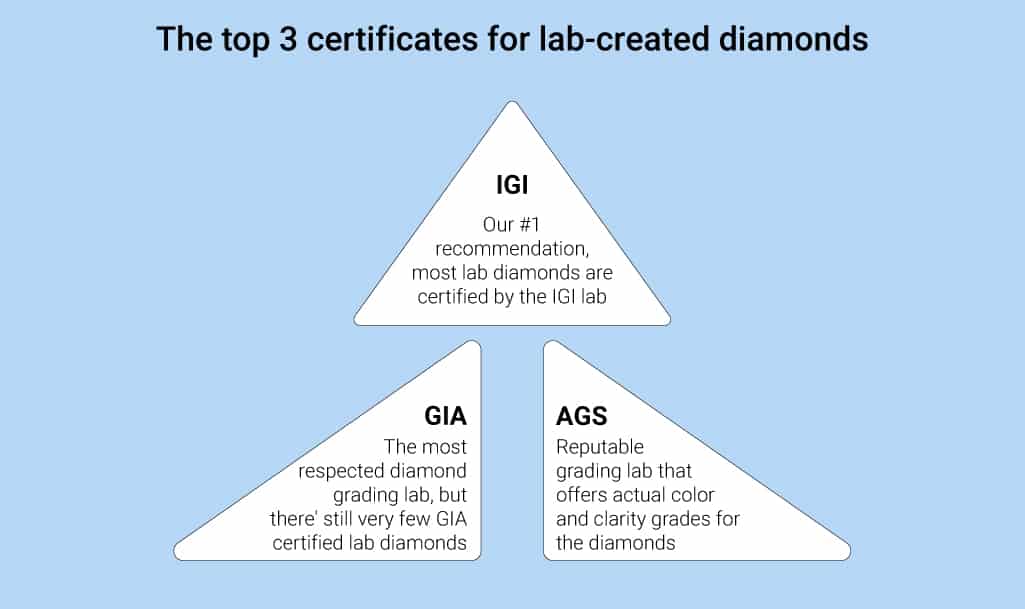Lab-Grown Diamond Certification
Why IGI is our preferred choice for lab-created diamonds
Why IGI is our preferred choice for lab-created diamonds
When purchasing a lab-grown diamond, it must have a certificate. The 4 Cs of diamond quality determine how much it is worth. Since you likely aren’t a gemologist, you need a reputable, independent certificate to know if the quality claims made by the jeweler are accurate. As with natural diamonds, the certificate will give you detailed information on the cut, color and clarity of the diamond. We will cover the various certificate options and how to use the information on the certificate to maximize the value of your lab-grown diamond purchase.
What is a lab diamond certificate?
Are lab-grown diamonds certified?
What to watch for in a certificate
IGI for lab-grwon diamonds
GIA for lab-grown diamonds
Why is GIA better than IGI for natural diamonds?
Bottom line recommendation
A diamond certificate is a document from an objective third-party lab that describes a diamond and its characteristics. The lab has no stake in the sale of the diamond, and they evaluate each stone on its merit.
Along with each potential lab-created diamond like this one from James Allen, you should receive and review its lab certification. This lab report or certificate describes various elements of the diamond, such as cut, clarity, and color. Expert jewelers evaluate, measure, and scrutinize the diamonds with tools, such as a loupe or microscope, then report their findings on the certificate.
Why you should trust us
There are several diamond laboratories in the world. Each lab grades and describes diamonds differently, and sometimes the differences are significant. When you shop for lab-created diamonds, it’s important to know which certificates are reliable.

Lab-created diamonds are certified, giving you important information on cut, clarity, carat weight, and more. By having a certificate, you can make an informed decision and compare similarly graded diamonds. For example, you can determine if this 1.32ct H VS2 diamond from James Allen for $1,370 offers more beauty than this 1.56ct I VS1 diamond from James Allen for $1,910.
Overall, the best certification for lab-created diamonds is the IGI, because they give specific gradings for qualities like color and clarity. The GIA has started fully grading lab-created diamonds recently as well, however, those are much harder to find.
Diamond certificates across the different grading entities are not equivalent. That’s why the price of lab-created diamonds are not comparable based on any certification alone. You should choose a diamond with a trustworthy certificate and review the diamond closely yourself.
With natural diamond certification, every lab gives out a single grade for aspects like color and Clarity. This isn’t any different with lab-created diamonds.
The IGI gives out detailed grades for lab-created diamonds. For instance, this 1.01ct princess cut diamond from James Allen has a G color grade and a VS1 clarity. When shopping for lab-created diamonds, you can compare IGI certificates to help you determine which diamond offers better beauty for the price.
All diamond grading is subjective. Contrary to popular belief, there isn’t a central organization that defines what an “H” color is or what a “VS2” clarity grade looks like.
If a lab entity consistently calls one color grade “H” while another lab consistently calls the same color “I”, it’s perfectly acceptable—as long as it’s consistent.
Even when a lab is consistent in its grading, though, it doesn’t mean the entity is trustworthy. Buying a lab-created diamond with a weak certificate (such as a certificate other than IGI) at a high price point isn’t a smart decision.
It’s best to compare diamonds graded by the same laboratory, such as two IGI diamonds. Because both are evaluated by the same third-party, you’re more likely to be comparing apples to apples. For example, you can look at this 1.32ct IGI-certified H VS2 diamond from James Allen for $1,370 to see if you’d rather purchase this 1.41ct IGI-certified H VS2 diamond also from James Allen for $1,590.
” I think lab diamonds are here to stay and I think it’s a choice for the consumer to make, and it’s our job to educate them.… A lab diamond doesn’t say I love you any less than a mined diamond says I love you.” Beryl Raff, Former CEO of Helzberg Diamonds as reported in JCK Online.
Regardless of the certificate, the price of the diamond should be thoroughly evaluated. The price should reflect the actual beauty, quality and Cut—both on the certificate and to the naked eye.
If you’re unsure if a lab-created diamond is priced too high, have an expert review it before purchasing. For specific questions about lab-created diamond prices and certifications, contact us.
Take a look at these beautiful rings. If you replace the diamond with one of James Allen’s lab-created diamonds, you will save a nice chunk of cash.
The IGI (International Gemological Institute) began as the blue-collar workhorse of the diamond industry. It became the most popular gem lab for major jewelry chains in Canada and the United States, such as Zales, Kay and other jewelers.
In some ways, IGI is like a factory. They tend to work fast and their prices for certificates are lower than the GIA. Diamonds sellers benefit from the lower cost, but not necessarily the end consumer.
For natural diamonds, we don’t recommend the IGI because the grading is lax and not as consistent as the GIA. Even though GIA has now full certificates for lab-created diamonds, there aren’t that many of them. IGI gives specific grades, such as color and clarity for lab-created diamonds as well and most of the lab market uses them. This allows you to compare diamonds and ensure you’re getting what you pay for.
We recommend purchasing IGI-certified lab-created diamonds from James Allen. Because their lab-grown diamonds come with an IGI certificate, you’re able to compare the available options. James Allen has 20 years of experience and focuses on customer satisfaction and competitive pricing. They also have the most high-tech imagery, so you can accurately evaluate diamonds yourself.
By buying an IGI lab-created diamond, you’ll have peace of mind knowing your diamond is equivalent to the quality that’s claimed.
The GIA (Gemological Institute of America) is the most renowned and respected diamond grading entity in the world. GIA certification is incredibly consistent and provides reassurance when purchasing natural diamonds.
An extensive GIA report is created for each natural diamond, including aspects like carat weight, table %, depth %, symmetry, polish grade, cut quality, color, clarity and more.
They have started doing the same for lab-created diamonds. However, there are still fewer GIA certified lab-created diamonds. Certified lab-created diamonds will trend towards IGI certification. Fortunately, Brilliant Earth’s lab-grown diamond inventory is mostly GIA certified. So you have that option.
Yes, you can find a GIA certified lab created diamond if you look hard enough. However, they aren’t that wide-spread. IGI certification for lab-created diamonds, however, is more common and includes all the specs you need to safely compare diamonds. Here is a stunning 1.50ct lab-grown diamond from Brilliant Earth.
While you can find beautiful IGI lab-created diamonds, the stone itself has little inherent value. The prices of lab-created diamonds have plummeted in the last few years and we expect that trend to continue. Lab-created diamonds also have no resale value.
Natural diamonds, on the other hand, are beautiful, timeless gemstones that typically maintain at least 50% of their original purchase price. By selecting a GIA-certified natural diamond, you’re purchasing a high-quality diamond that will maintain at least some of your investment.
For help in finding the best diamond for your budget, contact our experts.
Our preferred vendor for lab-created diamonds is James Allen. Their entire selection is IGI certified. By having a certificate, you can compare diamonds more easily to determine which stone gives you the most beauty for your budget. Their high-end photography makes it possible to look at each diamond up-close before purchase (also check out other recommended vendors for lab-created diamonds).
Blue Nile is another vendor that we recommend checking out. They specialize in lab-created diamonds and can offer a lot of options to choose from. They even have lab-grown diamonds with a GIA certificate like this stunner.
Overall, we do have some reservations about lab-created diamonds. While they’re beautiful and mimic real diamonds, they carry no inherent value. You can’t resell them and their prices have plummeted in the last few years. If you’re concerned about the long term value of your diamond, you’re better off buying a natural diamond.


Before you buy a diamond, get personal buying advice from industry veterans. We'll help you get the best diamond for the money.
DISCLAIMER: We don't use your email for marketing. Period.
A diamonds’ price is determined primarily by the 4 Cs of the diamond. On the wholesale level, diamond prices are first based on a diamond shape and
Buying an engagement ring is often one of the first major purchases in a person's life. The process can be fraught with tension as there are so m
A wide range of 1 carat diamonds exist both in online markets and local diamond jewelry stores. Not only are there significant differences in beauty
Please enter your email address to receive your 25% off coupon code:
Here is your coupon code: GFDSF3GF